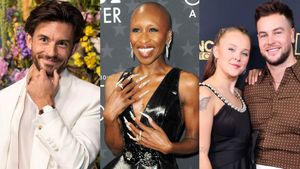An ultraconservative federal judge in Texas has ruled that certain religious employers, including for-profit companies, are eligible for exemptions from a Supreme Court ruling prohibiting anti-LGBTQ+ discrimination in employment -- but the national impact of the ruling remains to be determined.
Judge Reed C. O'Connor of the U.S. District Court for the Northern District of Texas ruled Sunday in a case brought by Bear Creek Bible Church and Braidwood Management against the Equal Employment Opportunity Commission. Bear Creek is located in Keller, in the Dallas-Fort Worth area, and Braidwood in Katy, a suburb of Houston. The latter is run by longtime anti-LGBTQ+ activist Steven Hotze, a leader of the successful campaign to repeal Houston's nondiscrimination ordinance in 2015.
The church and the company brought the suit against the EEOC, a federal government agency, in response to the Supreme Court's 2020 ruling in Bostock v. Clayton County, which held that discrimination based on sexual orientation or gender identity is sex discrimination and therefore banned by Title VII of the Civil Rights Act of 1964. The EEOC has issued guidance to employers on how to comply with the ruling.
Bear Creek Church refuses to employ people who do not conform to what it considers the biblical rules on sexuality, that is, "practicing homosexuals, bisexuals, crossdressers, and transgender or gender non-conforming individuals," as noted in O'Connor's ruling. It also requires workers to use the restroom designated for their "biological sex."
Braidwood runs a wellness center, a pharmacy, and other health-related businesses. "Because Hotze operates these entities as Christian businesses, he does not allow Braidwood to employ individuals who are engaged in homosexual behavior or gender non-conforming conduct of any sort," the ruling states. He refuses to recognize same-sex marriages for the purpose of insurance coverage.
Because Title VII exempts religious employers, Bear Creek Church is automatically exempted from complying with the Bostock ruling, O'Connor wrote. And Braidwood and other companies with strongly held religious beliefs qualify for an exemption because "Title VII places a substantial burden on its religious exercise," according to O'Connor. He also wrote that to employ people who violate the management's religious beliefs would interfere with the company's First Amendment rights to religious liberty and freedom of association.
Therefore, policies against "homosexual conduct" or sex-specific dress codes and restroom policies don't violate Title VII as interpreted in Bostock, he ruled. He did, however, rule that employers cannot legally discriminate on the basis of "bisexual conduct," as that would apply equally to men and women, or deny gender-reassignment surgery or hormone treatment, since that would discriminate against people with gender dysphoria.
O'Connor's ruling isn't the final word on the issue. "We would be stunned if there were not an appeal," Gregory Nevins, senior counsel and employment fairness project director at Lambda Legal, told The Advocate. The EEOC denied comment to The Advocate on the question of appeal, referring the inquiry to the Department of Justice, which is representing the EEOC. The DOJ has not yet responded to a request for comment.
Nevins stressed that anyone who has been discriminated against can and should complain to the EEOC or file a lawsuit and that other judges are free to follow or disregard O'Connor's reasoning. He thinks most will disregard it.
He also noted that usually courts consider the question of religious exemptions from a law when someone actually brings a suit over the law or a suit arguing they've suffered discrimination. But this suit is "preemptively seeking the right to discriminate," he said.
The Bostock ruling left the question of religious exemptions largely open; most courts have recognized churches' First Amendment right to favor members of their own faith for ministerial positions. There have been court battles over the distinction between ministerial and nonministerial employees, such as whether a teacher of a secular subject in a religious school is a ministerial employee; Supreme Court rulings have left some leeway for discrimination here. Whether for-profit companies can legally discriminate by citing religious beliefs remains disputed. The Equality Act, pending in Congress, would make clear that religious freedom is not an excuse for discrimination.
O'Connor has a record of anti-LGBTQ+ rulings. In 2019 he ruled against the portion of the Affordable Care Act that forbids anti-transgender discrimination in health care -- a provision that Donald Trump's administration sought to kill. Under President Joe Biden, the federal government has upheld this provision. O'Connor also ruled against guidance issued by President Barack Obama's administration on equal treatment of transgender students in public schools and, before the Supreme Court's nationwide marriage equality decision, ruled that the federal Family and Medical Leave Act did not apply to same-sex couples in states that did not recognize their marriages.




































































Charlie Kirk DID say stoning gay people was the 'perfect law' — and these other heinous quotes